7 Best Daily Leg Exercises for Women After 50
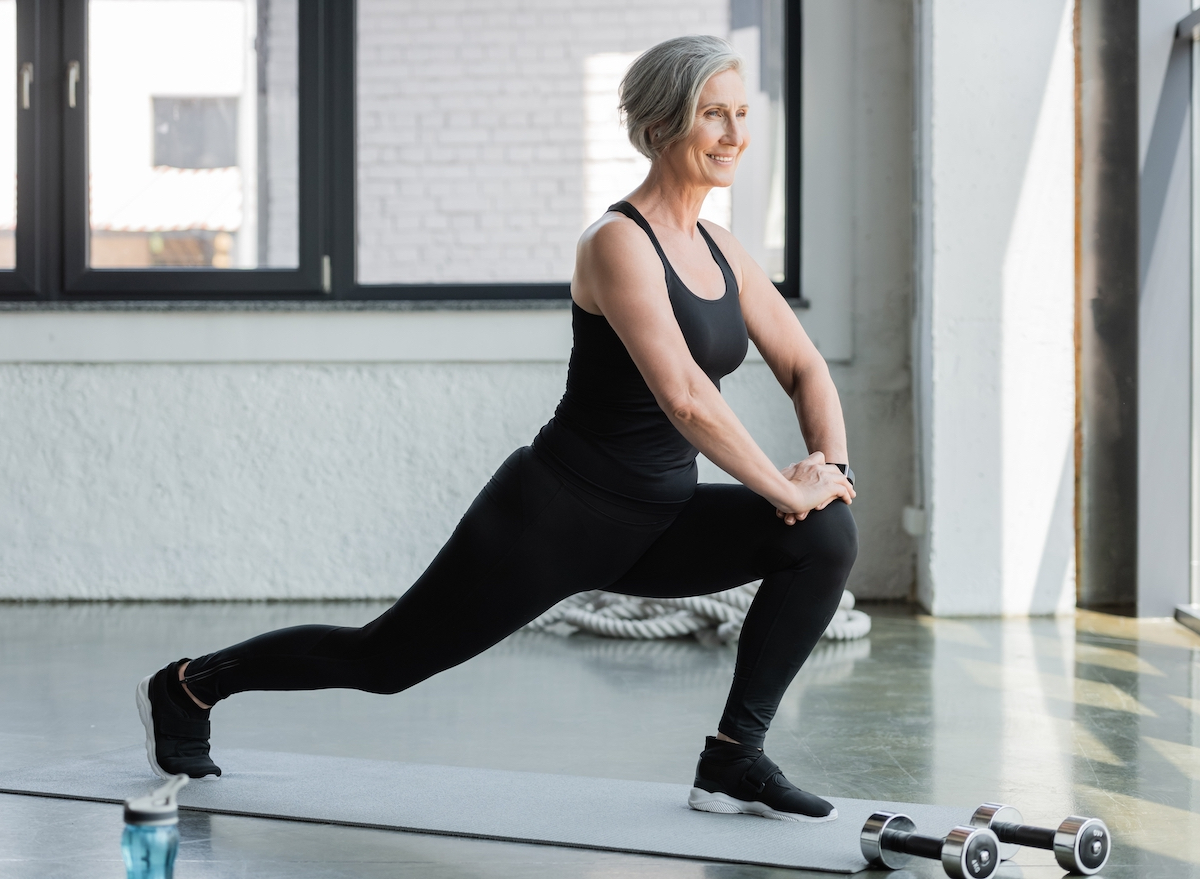
As women age, it's essential to maintain a consistent exercise routine that includes regular leg workouts. Strong legs provide better balance and stability and help with everyday tasks such as walking, climbing stairs, and even standing up from being seated, according to the National Institute on Aging. To help women stay fit and strong, we've teamed up with Rose McNulty, CPT, NASM-certified personal trainer and nutrition coach with Garage Gym Reviews. With her years of experience in the fitness industry, Rose knows what works and shares the seven best daily leg exercises for women after 50.
The below movements target multiple muscle groups in the legs, including the glutes, quads, hamstrings, and calves, to increase lower-body strength. Incorporating these exercises into your daily routine can help prevent injuries, improve mobility, and increase overall strength and endurance. So if you're ready to start sculpting toned legs, keep reading for the seven best daily leg exercises for women after 50. And when you're done, check out The #1 Leg Workout To Build Up Your Muscle Mass.
Squats
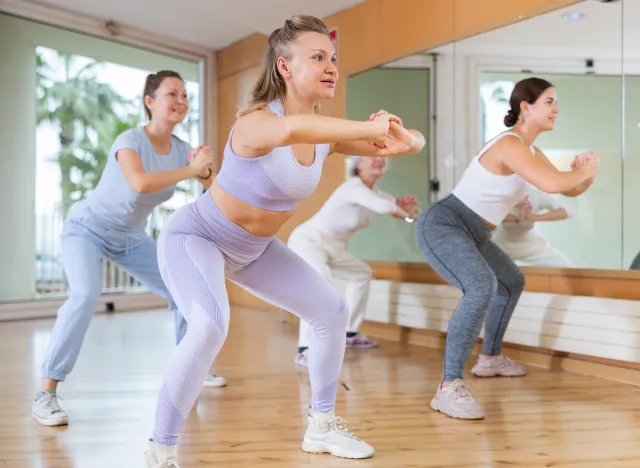
"The humble squat plays a crucial role in daily life, just as it does in an excellent lower-body workout, so this movement is important to train consistently," says McNulty.
To begin, stand with your feet about hip-width apart, placing your hands on your hips or in front of your chest. Keep your spine neutral and maintain good posture as you bend your knees and shift your hips back to lower into the squat. Once your thighs are parallel to the floor, stand back up, and repeat. Aim for four sets of 15 reps for bodyweight squats and three to four sets of eight to 12 reps for weighted squats.
Step-ups
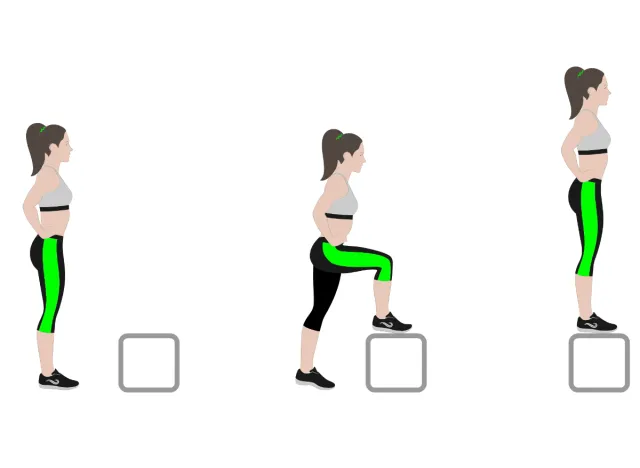
"Step-ups can be done virtually anywhere, and they're a great way to work on the range of motion in your lower body," says McNulty. "Because these work one leg at a time, they also minimize the chance that you'll compensate with one leg more than the other."
Stand in front of a bench, step, or plyometrics box. Step onto the box with your right leg, then follow with the left. Then, step back down with your left foot, allowing your right knee to bend before placing your right foot back down next to your left. Alternate for 12 to 15 reps per leg for three to four sets.
Side Lunges
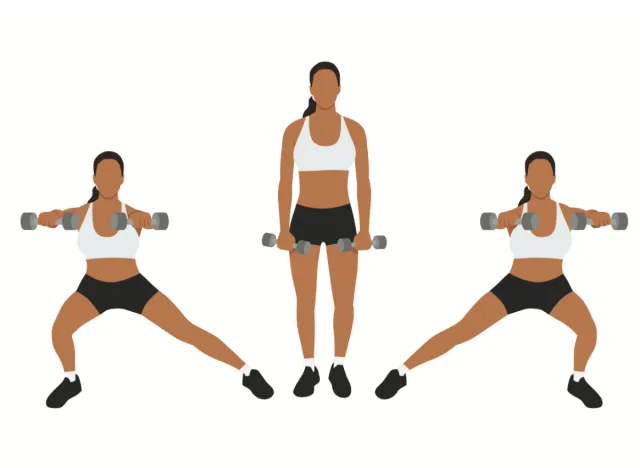
"Side lunges work the quads and glutes but also engage the adductor and abductor muscles inside and outside your thighs. Keeping all these muscles strong helps with hip stability in the long run," says McNulty.
Stand with your feet hip-width apart and hands in front of your chest, holding weight as if you're going to do a goblet squat. Take a big step out to the right with your right foot, and plant it with your toes facing forward. With your feet flat on the floor, bend your right knee and shift your hips back until your right thigh is parallel to the floor. Push off with your right foot to return to the starting position, then switch legs. Do 10 reps per side for three to four sets.
Front-and-Back Lunges
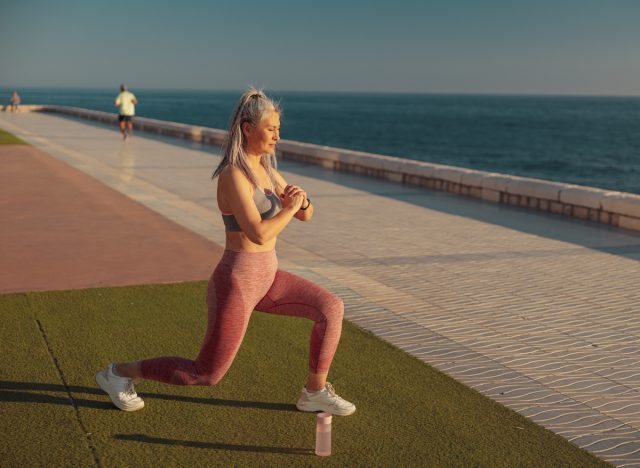
"Balancing on one leg is an essential aspect of overall stability as you age. In fact, the single-leg stance test is an indicator of fall risk among older adults," explains McNulty. "During these lunges, try to minimize pauses between the front and back portions of these reps to maximize the time you spend stabilizing yourself on one leg at a time."
Stand with your hands on your hips or in front of your chest and your feet hip-width apart. Take a big step forward with your right foot, and shift your weight onto that foot as you plant it. Next, bend your right knee until your right thigh is parallel to the floor. Now, push off your right foot, and move back to the starting position, but only hover your right foot over the floor as you step it behind you. Next, bend your left knee to lower down until your left thigh is parallel to the floor. Step back to the start, and repeat. Perform three sets of 10 reps per leg.
Side Lying Leg Raises
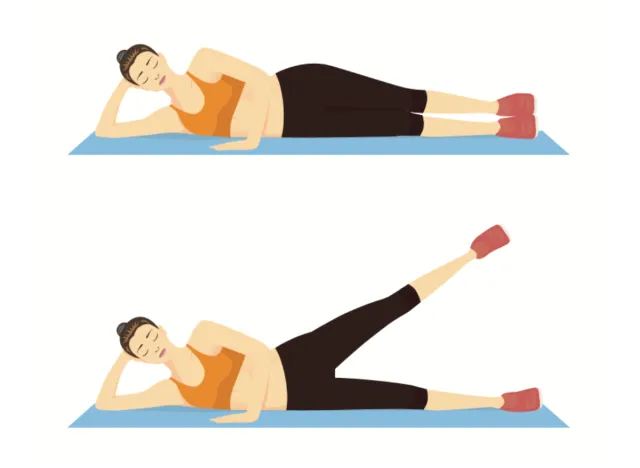
"Another movement that works the hip abductors on your outer thighs, as well as the sides of your abs and your glutes, side lying leg raises promote hip strength and overall core stability," states McNulty.
Lie on your right side on a mat with your legs extended and your head supported by your right hand. Place your left hand on your hip (or on the mat in front of you), then lift your left leg off the floor until you feel the movement in your glutes and abductors on your outer thigh. Next, lower your leg back down, and repeat. Aim for three sets of 15 to 20 reps per side.
Stiff-Leg Deadlifts
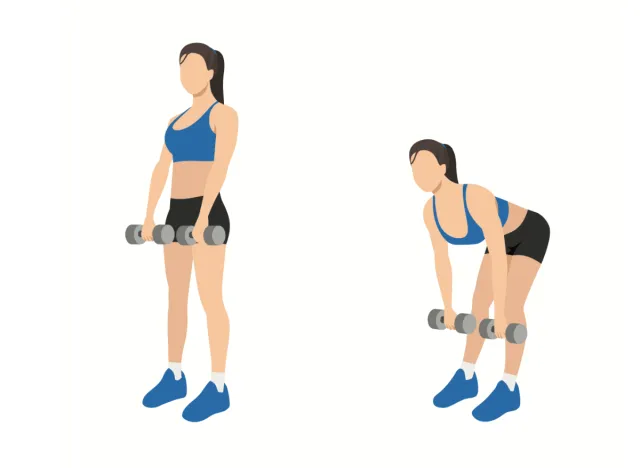
"Stiff-legged deadlifts work the hamstrings, glutes, and lower back," says McNulty. "Ideally, you should perform this exercise with weights. However, you can just as easily hold gallon jugs or anything you have around the house to add resistance."
Hold a light weight (e.g., dumbbell, plate, kettlebell) in each hand, and stand with your knees slightly bent and your feet hip-width apart. Hinge at the hips, and allow your hips to shift backward as you lower your torso forward and down. Keep your spine neutral and shoulders back. Once your hands are at about mid-shin and you feel the movement in your hamstrings, reverse the motion, return to start, and repeat. Do 12 to 15 reps for three to four sets.
Flutter Kicks
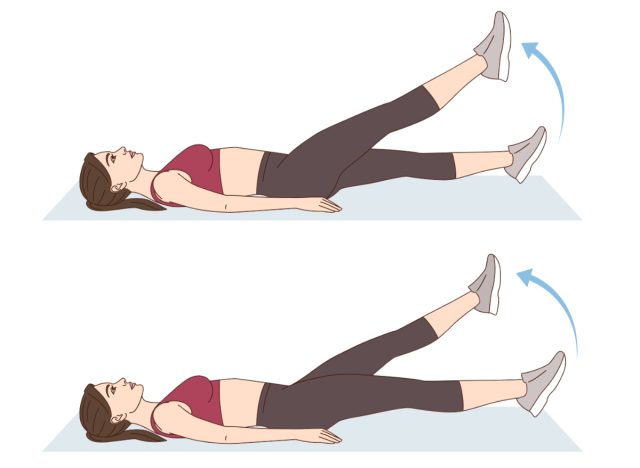
"While you might consider these an ab workout, flutter kicks also engage the quads and hip flexors. Take it slow with these, and don't let your feet touch the floor between reps until you need a break," advises McNulty.
Lie face-up on an exercise mat, and engage your abs. Keep your arms down on the mat or hands behind your head, being careful not to pull on your neck. Next, lift both legs a few inches off the floor, ensuring your lower back stays on the mat. Next, move your feet up and down like scissors, alternating with each rep and making sure not to touch the floor with either foot. Perform these for 30 to 45 seconds for four sets with 60 seconds of rest between sets.









